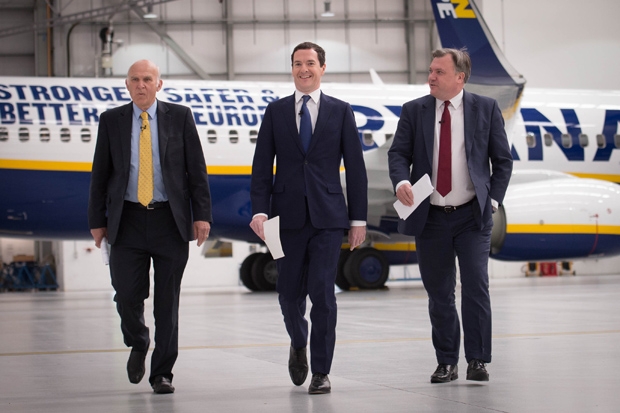A Ryanair plane in a Stansted hangar was not the best backdrop for George Osborne’s claim that the economic argument about the European Union is now over and that his ‘consensus’ has prevailed. In recent years, Ryanair has lost its status as the fastest-growing budget airline in Europe: that honour goes to Norwegian Air, which has thrived outside the EU. And on the day of the Chancellor’s speech, a group of Ryanair passengers had announced their intention to take out a lawsuit against the company for what they see as unfair tricks to disguise the true cost of tickets.
The Chancellor does the reverse of Ryanair: he tries to frighten us about the imaginary costs and charges of a ticket to Brexit. Far from the closing down the economic debate, however, his latest batch of scare stories raise interesting new possibilities. If house prices really were to fall, as he now tells us would happen in the event of Brexit, would that be such a bad thing? Not if you are one of the millions of young people unable to afford a home thanks to surging house price inflation over the past 20 years. Or if you want to buy a bigger property and are aghast at the amount you need to borrow to do so.
The Treasury declared this week that leaving the EU would push up inflation from its current 0.3 per cent. Again, would that really be so terrible? The target is 2 per cent. If interest rates rose, savers might be granted some relief — and the economy might, after ten years, be heading towards something resembling normality. As for the prophecy that sterling would fall, many exporters would be cock-a-hoop if it did. It would make their goods far cheaper: indeed, after a sterling correction, the problem for British manufacturers might end up being an inability to cope with demand.
It’s funny to think that just a few months ago Osborne was telling his cabinet colleagues that they could not really campaign on the economy because the arguments would be implausible. After all, the British economy had just created more jobs than all the other European countries put together — how could we claim that the world’s fifth largest economy could not go it alone? Last year the Prime Minister himself said he wanted to ‘debunk’ what ‘some people seem to say’: that Britain couldn’t flourish outside of the EU.
Now both are making the reverse argument. And, worse, claiming that their opponents are fantasists who believe in the Loch Ness monster (the Chancellor’s analogy) or offer succour to the Islamic State (as the Prime Minister bizarrely suggested this week).
With five weeks to go until the referendum, it’s understandable that Cameron and Osborne should end up exaggerating their positions. One has to forgive them, to appreciate that such campaigns are stressful and make politicians (and businesses) say daft things. But the figures being spewed out ought not to be confused with sober economic analysis. Take the Chancellor’s claim that households would be £4,300 worse off 15 years after Brexit. Even if one accepts the Treasury’s study, built on a pile-up of rosy scenarios, households would be £5,400 better off after Brexit. And (on the Treasury’s maths) about £6,880 better off if we stay in the EU. So there is a gap of about £1,480, a sum that could be easily remedied by tax cuts.
https://www.youtube.com/watch?v=GGCamWvgyY8
The Confederation of British Industry commissioned a similar study from PriceWaterhouseCoopers to bolster the case for remaining in the EU. This found the British economy would grow by 41 per cent by 2030 if we stayed in the EU, but by 39 per cent if we were to leave and strike a free trade agreement. Its worst-case scenario – no deal with the EU and a reversion to World Trade Organisation maximum tariffs – would mean economic growth of 36 per cent over those 15 years, rather than 41 per cent. The difference between these figures is hardly terrifying – and, many would argue, a small price for the retrieval of British sovereignty. When you consider the error margins for 15-year forecasts, the gap becomes even less significant.
So the economics, if honestly stated, simply do not represent a compelling case against Britain leaving the EU. This is why the Chancellor had to sex it up by concocting his own figures, and ended up hauled up before a parliamentary committee to explain why had had done so.
The choice on 23 June is not between security or a gamble. It is between the uncertainty of staying in a deeply troubled European Union, which may yet collapse, or the uncertainty of Britain wresting itself from that union and offering to work with her neighbours on her own terms. The Remain side still has the advantage of being the default position: if in doubt, many will be inclined to vote for no change. But trying to spin false stories about economic Armageddon could yet turn the country against them.






Comments